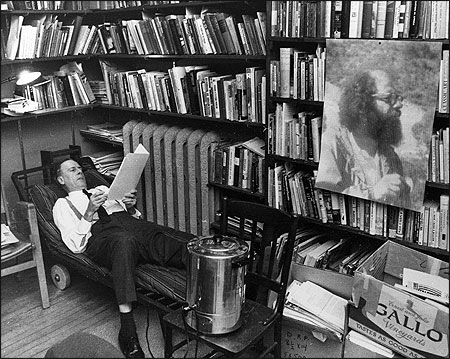The novel will be different, but it will be. And, no, it won’t again have the cultural primacy it once did–enjoyed by the minority but able to hold sway over the masses–but nothing in the culture will truly have primacy. It’s a free-for-all now. In most ways, that’s better. From Will Self’s Guardian article, “The Novel Is Dead (This Time It’s for Real)“:
“Literary critics – themselves a dying breed, a cause for considerable schadenfreude on the part of novelists – make all sorts of mistakes, but some of the most egregious ones result from an inability to think outside of the papery prison within which they conduct their lives’ work. They consider the codex. They are – in Marshall McLuhan’s memorable phrase – the possessors of Gutenberg minds.
There is now an almost ceaseless murmuring about the future of narrative prose. Most of it is at once Panglossian and melioristic: yes, experts assert, there’s no disputing the impact of digitised text on the whole culture of the codex; fewer paper books are being sold, newspapers fold, bookshops continue to close, libraries as well. But … but, well, there’s still no substitute for the experience of close reading as we’ve come to understand and appreciate it – the capacity to imagine entire worlds from parsing a few lines of text; the ability to achieve deep and meditative levels of absorption in others’ psyches. This circling of the wagons comes with a number of public-spirited campaigns: children are given free books; book bags are distributed with slogans on them urging readers to put books in them; books are hymned for their physical attributes – their heft, their appearance, their smell – as if they were the bodily correlates of all those Gutenberg minds, which, of course, they are.
The seeming realists among the Gutenbergers say such things as: well, clearly, books are going to become a minority technology, but the beau livre will survive. The populist Gutenbergers prate on about how digital texts linked to social media will allow readers to take part in a public conversation. What none of the Gutenbergers are able to countenance, because it is quite literally – for once the intensifier is justified – out of their minds, is that the advent of digital media is not simply destructive of the codex, but of the Gutenberg mind itself. There is one question alone that you must ask yourself in order to establish whether the serious novel will still retain cultural primacy and centrality in another 20 years. This is the question: if you accept that by then the vast majority of text will be read in digital form on devices linked to the web, do you also believe that those readers will voluntarily choose to disable that connectivity? If your answer to this is no, then the death of the novel is sealed out of your own mouth.”
Tags: Will Self

